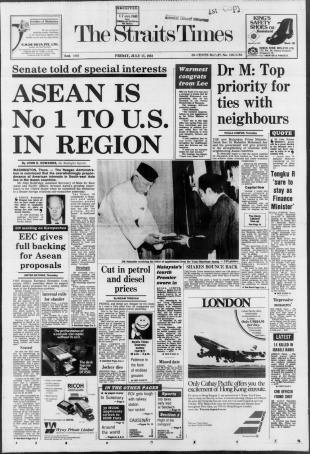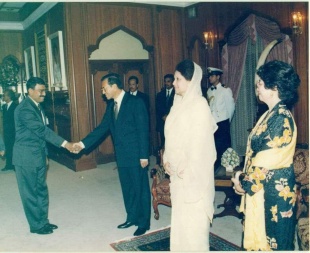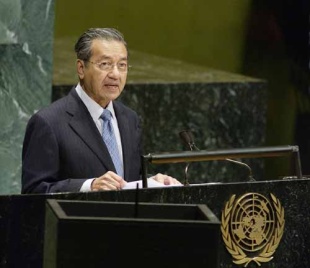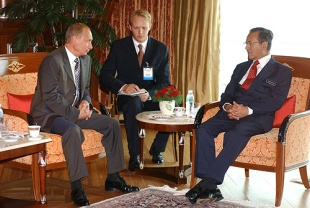MAHATHIR AS THE LEADER OF MALAYSIA
Datuk Seri Mahathir bin Mohamad was Malaysia's fourth and seventh prime minister,. He served for 22 years from July 1981 to October 2003 and again from May 2018 to March 2020. In 1981, as leader of the United Malays National Organization (UMNO) he became prime minister for the first time and then led the National Front parties to victory in elections through the 1980s and 1990s. His government was criticized for repressing Chinese and Indian minorities. In 1989, a formal peace treaty was signed between the Malay Communist Party (MCP) and the Kuala Lumpur government, formally ending an insurgency that began in 1948. [Source: Columbia Encyclopedia, 6th ed., Columbia University Press]
Mahathir was the first non-aristocratic leader of Malaysia. He is credited with replacing colonial subservience with national pride, an raising a country from the Third World to developed world status at an astounding pace. He forcibly united Malays, Chinese and Indians. He held them together without having the whole thing coming unraveled as happened in Indonesia.
Mahathir ascendancy to the position of prime minister caused concern among ethnic Chinese and Indians in Malaysia who regarded him as interested in promoting Malay status at the expense of other ethnic groups. However, Mahathir’s early years in office were marked primarily by attempts to prevent official corruption and by success in increasing the power of elected officials relative to Malay rulers. Mahathir also ambitiously pursued economic reforms, such as orienting the economy toward the production of export goods, promoting joint ventures with Asian firms, and privatizing many state industries, which often were taken over by ethnic Malay-controlled corporations. [Source: Library of Congress, 2006]
Mahathir ruled under what was called the Barisan Nasional (BN), or National Front, a coalition of the UMNO and 13 ethnic parties. In the 1990s, UMNO and the BN continued their impressive streak of election victories, and Mahathir’s influence continued to grow. The Nation Front won 166 seats (84 percent )of the 192 parliamentary seats in the 1995 election and 149 of the 193 parliament seats in the 1999 election.
RELATED ARTICLES:
MAHATHIR MOHAMAD: HIS LIFE, VIEWS, CHARACTERS, OUTRAGEOUS STATEMENTS factsanddetails.com
RISE OF MODERN MALAYSIA 1963-1990: DEVELOPMENT, ECONOMICS, POLITICS factsanddetails.com
COMMUNIST INSURGENCY IN MALAYSIA (1946-1989): ORIGINS, ACTIVITIES, POLITICS, ENDING IT factsanddetails.com
THE EMERGENCY IN MALAYSIA: DRACONIAN LAWS, NEW VILLAGES, ATROCITIES factsanddetails.com
MALAYSIAN INDEPENDENCE AND THE CREATION OF MALAYSIA factsanddetails.com
SINGAPORE IN THE LATE 1950s, EARLY 1960s: PART OF MALAYSIA OR AN INDEPENDENT STATE factsanddetails.com
MALAYSIA AFTER WORLD WAR II factsanddetails.com
RACIAL DISCORD IN MALAYSIA: RIOTS ON MAY 13, 1969, AFFIRMITIVE ACTION, BOAT PEOPLE factsanddetails.com
ELECTIONS IN MALAYSIA factsanddetails.com
POLITICS IN MALAYSIA: LEADERS, ETHNICITY, RELIGION, SYMBOLS, PROTESTS factsanddetails.com
POLITICAL PARTIES IN MALAYSIA factsanddetails.com
ASIAN FINANCIAL CRISIS OF 1997-98 IN MALAYSIA factsanddetails.com
ABDULLAH AHMAD BADAWI: MALAYSIA PRIME MINISTER (2003-2009) factsanddetails.com
NAJIB RAZAK: LIFE, POLITICAL CAREER, SCANDALS factsanddetails.com
MALAYSIA UNDER PRIME MINISTER NAJIB RAZAK 2009-2018 factsanddetails.com
1MDB SCANDAL: BILLIONS, BIRKIN BAGS, CELEBRITIES, JHO LOW, JAILTIME FOR NAJIB factsanddetails.com
ANWAR IBRAHIM'S LIFE AND POLITICAL CAREER factsanddetails.com
ANWAR IBRAHIM'S TRIALS, LEGAL PROBLEMS AND TIME IN JAIL factsanddetails.com
ANWAR IBRAHIM FINALLY BECOMES PRIME MINISTER factsanddetails.com
Mahathir’s Early Years as Prime Minister
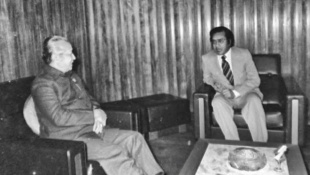
Soon after becoming Prime Minister, Mahathir strengthened his office by dramatically reducing the power of the sultans who ruled Malaysia’s states. Often he acted like a sultan himself. He often made decisions based on instinct with little consultation with his aides. He lectured those around him, who in turn gave instructions to their subordinates and they spread out to convey Mahathir’s wishes. In 1988 Mahathir undermined the independence of the judiciary by removing the president of the supreme court and other senior judges from office. Some opposition leaders have been jailed under the internal security act.
When Mahathir became prime minister in 1981 there were doubts whether he was up to the task. "Worse still, critics branded him as being anti-Chinese," one journalist told The Nation, noting that Mahathir's rise and the anti-Chinese label did scare a number of Chinese into leaving. "But look at today, it's the Chinese who cannot hide their love for Mahathir," he said. Early during Mahathir's tenure as prime minister, a bitter dispute erupted within the ruling UMNO party and it was divided into two camps, which were colloquially known as 'Team A' comprising Mahathir loyalists, and 'Team B', which supported former Minister of Finance Tengku Razaleigh Hamzah and former Deputy Prime Minister Musa Hitam. Mahathir prevailed, leading to the exclusion of Tengku Razaleigh Hamzah from the newly established UMNO (Baru) or New UMNO in February 1988, [Source: Thepchai Yong, The Nation, October 2002]
Mahathir’s economic and other policies were subject to widespread criticism, which occasionally led to contentious divisions within UMNO. He was often viewed as uncompromising and highly aggressive in the pursuit of his policies, yet throughout the 1980s he led UMNO and the BN to successive election victories. Heightened criticisms of Mahathir coincided with rising ethnic tensions over religion, Chinese-language education, and other issues. Claiming to preempt violent ethnic riots, in 1987 Mahathir ordered a crackdown on critics of government policies, and police arrested more than 100 individuals—including politicians—and closed three newspapers. The detainees were later released, but the government introduced numerous restrictions on civil liberties, such as making the dissemination of “false” news illegal. [Source: Library of Congress, 2006]
In 1991 UMNO publicly challenged the conduct and political role of Malaysia’s nine hereditary rulers, reviving a 1990 resolution calling for limits on royal interference in politics. The issue escalated in November 1992 with proposals to amend the constitution to remove the rulers’ immunity from prosecution. These were prompted by several high-profile incidents, notably the assault of a hockey coach by the sultan of Johor and an earlier homicide conviction of the same ruler—before his accession—followed by a royal pardon. [Source: Worldmark Encyclopedia of Nations, Thomson Gale, 2007]
The constitutional amendments were passed in January 1993. Following their adoption, royal privileges not explicitly guaranteed by the constitution were withdrawn. Although the rulers initially rejected the changes, they later accepted a compromise that effectively ended their blanket legal immunity while preserving the requirement of royal assent for laws affecting the monarchy. Critics argued that Mahathir’s handling of the episode highlighted tensions between his authoritarian governing style and traditional Malay political norms, and underscored his broader efforts to strengthen executive power, weaken judicial independence, consolidate UMNO’s dominance of parliament, and tighten control over the press.
Development Under Mahathir
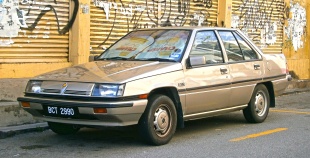
Mahathir was the leading force in making Malaysia into a major industrial power. He is credited with turning Kuala Lumpur into a modern city with (for a while) the world’s tallest building and high-tech industrial areas but criticized for ignoring the villages and provinces. Even, his home province of Kedah seems undeveloped and stuck in a time warp. Over the years, Islamic parties have gained power there at the expense of his party. Mahathir developed the "Malaysia Can" slogan in 1993 and developed the Vision 2020 program in which he planned to make Malaysia a fully developed country with 70 million people (compared to 20 million in 1998) by the year 2020. He put a lot of money into expansive infrastructure projects (see infrastructure) and high-tech development even when Malaysia was suffering an economic crisis. Mahathir once called himself as "cyber addict." He was one of the first world leaders to have his own blog and website and said he to create a paperless government in Malaysia. Prodded by his daughter, he spoke out on women’s rights and AIDS awareness.
Ian Buruma wrote in The New Yorker, “One of Dr Mahathir’s ambitions was to make Malaysia into an Asian Silicon Valley. Foreign companies were invited to invest in a “Multimedia Super Corridor” between the new international airport and the twin Petronas Towers (also known as Dr Mahathir’s Erections), which rise like gigantic pewter cocktail shakers in the centre of Kuala Lumpur. An international committee of experts, including Bill Gates, advised Dr Mahathir that, if he wished to attract foreign investment, censoring the Internet would be unwise. As a result, Malaysian readers now have access to news and commentary that is independent of the government. [Source: Ian Buruma, The New Yorker, May 19, 2009]
Mahathir aimed to break with Malaysia’s colonial past by rapidly modernizing the country through large-scale development projects. Under his leadership, rural areas like Dengkil were transformed into hubs of infrastructure and technology, including the new international airport, the Cyberjaya high-tech corridor, and the planned administrative capital, Putrajaya. These projects dramatically reshaped Malaysia’s physical and economic landscape. However, the transformation remained incomplete: Putrajaya did not fully replace Kuala Lumpur as a diplomatic center, the high-tech corridor lacked world-class research firms, and some flagship projects—such as the national steel and automobile industries—struggled with inefficiency and global competitiveness.[Source: Alan Sipress, Washington Post, October 27, 2003]
Mahathir is credited with creating export-driven industrialization programs, improving the work ethic in Malaysia and increasing entrepreneurial skills. The boom was spearheaded by money from Japanese companies and Malaysian Chinese businessmen, who maintained their influence despite affirmative action for Malays. The manufacturing sector of the GDP increased from 6.7 percent in 1960 to 27 percent in 1990 behind expansion of production of textiles, cars and electronic items. Japanese electronics manufacturers began setting up assembly plants, primarily in the Penang, in the 1960s and 1970s. Many of the workers were women in their 20s who worked for low wages. The United States also set up electronics assembly plants in Malaysia. To boost moral factory owners organized Miss National Semiconductor, Miss Advanced Micor Devices and Miss Free Trade Zone beauty contests.
While the export of raw material remained an important part of the Malaysian economy, manufacturing became more of a focus under Mahathir. Important manufactured goods have included rubber gloves, catheters, rubber-threads, room air conditioners, semiconductors and audio visual equipment.
By the 1990s Malaysia had become the world's largest exporter of semiconductors, an industry that dates back to the mid-1970s when many U.S. and Japanese companies set up factories in Malaysia. At that time there was also a trend to produce more assembled products like cameras and VCRS from semiconductors in Malaysia.
Malaysian Economy Under Mahathir
Malaysia's rapid development has been attributed to the transparency of government policies, its educated and skilled workforce, well-developed infrastructure, good communications facilities and efficient bureaucracy. Malaysia in the 1990s was reminiscent of South Korea in the 1980s and Japan in the 1960s and 1970s, when people are intoxicated with their new affluence and happy to leave their poverty behind them. High tech industries developed in Malaysia in the 1990s and 2000s included advanced electronics, scientific instruments, biotechnology, automated manufacturing systems, electra-optics and non-linear optics, advanced composite materials, optoelectronics, software engineering, alternative energy sources and aerospace.
Over three decades, Malaysia transformed from a primary commodity–dependent economy into one driven by manufacturing and industry. Rubber and tin, which made up over half of export value in 1970, fell to less than 5 percent by 1990 as manufacturing—especially electronics—became the main growth engine. From the mid-1980s to the mid-1990s, the economy expanded rapidly, averaging around 8–9 percent annual growth, supported by privatization, the New Development Policy, and heavy investment in infrastructure and mega-projects such as the Petronas Twin Towers, KLIA, Putrajaya, and the Multimedia Super Corridor.
Malaysia’s growth ranked among the fastest in the world, lifting per capita incomes sharply and keeping inflation and unemployment low. Between 1986 and 1996, growth averaged about 8 percent a year, lifting the country from near developing-country status to the world’s 13th-largest economy. Per capita income rose from US$2,255 in 1990 to US$3,908 in 1995 and was projected to reach US$6,500 by 2000 before the crisis intervened. From 1965 to 1995, Malaysians—like Indonesians and Thais—roughly tripled their income levels, although this lagged behind the Four Asian Tigers (South Korea, Taiwan, Hong Kong, and Singapore), which achieved sixfold increases. Malaysia’s growth averaged 5.2 percent in the 1960s, accelerated to 8.3 percent in the 1970s, and slowed in the early 1980s due to falling prices for oil, palm oil, and rubber. From 1987 to 1995, however, growth rebounded strongly, averaging 8.8 percent and exceeding 8 percent for eight consecutive years.
Mahathir, the Malays and Race
After the New Economic Policy ended in 1990, affirmative action continued under the New Development Policy (1991), which shifted from broad redistribution to more selective support for bumiputera deemed capable and competitive. The NDP formed part of Vision 2020, a long-term strategy to transform Malaysia into a fully industrialized nation by 2020, quadruple per capita income, and move the economy from low- to high-technology production with higher capital investment and greater domestic value added.
Alan Sipress wrote in the Washington Post: Publicly, Mahathir has said his chief regret has been his failure to hoist the Malay majority to the same level as the country's non-Malays, in particular the Chinese. He has overseen years of affirmative action that steered public contracts and other benefits to Malays. This has enriched an elite close to the ruling party. But many Malays feel bypassed. "The great irony is that this great Malay nationalist wanted to lift up the Malay people by their bootstraps to new heights and now these very same people can't wait to see the back of him," said Edmund Terence Gomez, a social analyst at the University of Malaya. [Source: Alan Sipress, Washington Post, October 27, 2003]
Ian Buruma wrote in The New Yorker: “Mahathir, whose father had some Indian ancestry, had always been obsessed with race, and the modern era of Malaysian politics can be traced to his book “The Malay Dilemma,” published in 1970, a decade before he came to power. It is a distillation of the kind of social Darwinism imbibed by Southeast Asians of Dr Mahathir’s cohort through their colonial education. The Malay race, the book argues, couldn’t compete with the Chinese for genetic reasons. Whereas the Chinese had been hardened over the centuries by harsh climates and fierce competition, the Malays were a lazy breed, fattened by an abundance of food under the tropical sun. Unfettered competition with the Chinese “would subject the Malays to the primitive laws that enable only the fittest to survive,” Dr Mahathir warned his fellow-nationals. “If this is done it would perhaps be possible to breed a hardy and resourceful race capable of competing against all comers. Unfortunately, we do not have four thousand years to play around with.” [Source: Ian Buruma, The New Yorker, May 15, 2009]
“And so the Malays had to be protected by systematic affirmative action: awarded top positions and mandatory ownership of business enterprises, along with preferential treatment in public schools, universities, the armed forces, the police and the government bureaucracy. Otherwise the “immigrants,” as the ruling party still calls the Chinese and the Indians, would take over. “The Malay Dilemma” was immediately banned for being divisive. The country was still reeling from the race riots of 1969, when, after a predominantly Chinese party enjoyed an election victory, hundreds of Chinese were attacked by Malays. Killings led to counter-killings. Such intergroup tensions were hardly new: ever since Britain left its former colony, political parties have used ethnic resentments to gain votes, while PAS sought to turn Malaysia into an Islamic state. Presiding over this fraught mosaic of ethnic and religious politics throughout the nineteen-sixties was the aristocratic Prime Minister Tunku Abdul Rahman “” until, in the fall of 1970, he was brought down by the brand of Malay nationalism advocated in Dr Mahathir’s book.”
Corruption Under Mahathir
Mahathir Mohamad claimed he was not corrupt. He took only a $4,000 a year salary and turned over gifts and cars given to him to the state museum on the island of Langkawi. He told Newsweek that when ever the topic of his children come up at meetings he excuses himself. “They’re not idiots, they are doing well in business,” he said. In 2001, Mahathir’s son Mokhzani told Newsweek that he was probably worth about $60 million. A good chunk if his money came from a hospital supply contract for the southern provinces of Malaysia.
Although Mahathir championed himself as a corruption fighter and friend of the poor, the gap between rich and poor and cronyism rose under his watch. He awarded contacts for some of Malaysia’s biggest multibillion dollar projects to his friends and friends of his ministers. Still, these friends had to perform. If they didn’t they were purged. In a typical case, a company owned Mahathir’s close friend Syed Mokhtar Albukhary, was awarded the contract to bought the a new $3.8 billion railroad across peninsular Malaysia. The contract was awarded without any competitive bidding and previous deals made with China and India were canceled.
In 2006, former tycoon Tajudin Ramli accused ex–prime minister Mahathir Mohamad of forcing him in 1994 to buy a controlling stake in Malaysia Airlines at well above market value as a form of “national service” to bail out the government and central bank. Tajudin claimed the deal was directed by Mahathir and then–finance minister Daim Zainuddin, with verbal assurances that he would be protected from losses, though nothing was put in writing. [Source: AFP, July 25, 2006; Source: Associated Press, July 7, 2006 |*|]
After the 1997 Asian financial crisis, Tajudin’s heavily indebted companies were taken over by the state restructuring agency Danaharta, and the government later repurchased his airline stake at the same inflated price, prompting public criticism of cronyism. Tajudin sued the government and state-linked entities for more than 13 billion ringgit, arguing he was a victim rather than a beneficiary of the arrangement. Mahathir denied the allegations, saying he never instructed Tajudin to buy the shares and rejecting claims of coercion or improper conduct.
Repression Under Mahathir
Under Mahathir, Malaysia’s political culture became increasingly centralised and authoritarian, due to Mahathir's belief that the multiethnic Malaysia could only remain stable through controlled democracy. Mahathir concentrated power more and more and more in his own hands without being accountable to anyone. He controlled the police and his image stood behind every cash register in Malaysia. Young people were arrested for "spreading false news on the Internet." Mahathir used to joke that maybe he was the first dictator in the world to elected in the democratic process.
As the years passed after that he became more authoritarian and accusations of cronyism and running the country through a system of political patronage increased. The Mahathir government banned rallies, took the police from their normal jobs and used them to initimidate members of the opposition, and discharged people on trumped up terrorism, murder and robbery charges. When asked about the American concept of freedom and human rights," Mahathir roared, "Free for whom? For rogue speculators. For anarchists wanting to destroy weak countries in their crusade for open societies." Many ordinary Malaysians were afraid of openly criticizing the government out of fear of what might happen to them. Civil servants were been forced to sign a “good behavior” document that made it easier for the government to fire them if they criticize the government. Students were kicked out of university and a lecturer was fired and 47 other were disciplined for engaging in “anti-government” activities.
Under Mahathir, Richard Lloyd Parry wrote in The Times: “Malaysia was a democracy, but a timid one in which the press agreed with almost everything the government said. Those who spoke out against the government were liable to find themselves locked up without trial under the British colonial era’s Internal Security Act. One of the low points for human rights came in 1998 when Anwar Ibrahim, his then deputy, was arrested on charges of sodomy and corruption — charges that many still regard as trumped up by allies of Dr Mahathir, who felt threatened by the younger man’s popularity. He appeared in court with his face bruised from a beating in police custody. The perpetrator, it later turned out, was Dr Mahathir’s own chief of police. [Source: Richard Lloyd Parry, The Times, October 30, 2006 ///]
“In his 22 years as their prime minister, the prickly Dr Mahathir was not noted for his tolerance of criticism, constructive or otherwise. Newspapers toed the government line or soon found themselves in difficulty, and judges whose rulings were not to Dr Mahathir’s liking were unceremoniously dismissed. It was an open secret that his method of governing combined strong state intervention with complex patterns of political patronage, but curiosity about the lucrative business opportunities enjoyed by his sons and specially favoured associates was robustly discouraged. Anwar Ibrahim, the deputy he initially groomed to succeed him, spent years in prison on trumped-up charges for daring to say publicly that corruption had reached critical dimensions. ///
Mahathir and the Internal Security Act
After nearly losing an election in 1987 and facing leadership challenges among his own party, Mahathir placed the independent judiciary under parliamentary control, threw critics in jail without a trial or even charges, and muzzled the free press. In 1987 the Mahathir government used the Internal Security Act to detain political and civil leaders and shut down four newspapers, claiming the measures were needed to prevent racial violence. The actions were widely criticized, including by former prime minister Tunku Abdul Rahman, and were accompanied by tighter controls on the media and new licensing laws. That same period saw intensified challenges to Prime Minister Mahathir Mohamad within UMNO. A court ruling in 1988 declared UMNO an unlawful society due to election irregularities, prompting Mahathir to dissolve it and create UMNO Baru, with members required to re-register. [Source: Worldmark Encyclopedia of Nations, Thomson Gale, 2007; Wikipedia]]
The Internal Security Act was invoked in October 1987 arresting 106 people, including opposition leaders. The head of the judiciary and 5 members of the supreme court who had questioned his use of the ISA were also arrested, and a clampdown on Malaysia's press occurred. This culminated in the dismissal and imprisonment on unsubstantiated charges of the Deputy Prime Minister, Anwar Ibrahim, in 1997 after an internal dispute within the government. The complicity of the judiciary in this piece of persecution was seen as a particularly clear sign of the decline of Malaysian democracy.
The ISA was again used in 1990 against individuals linked to Parti Bersatu Sabah (PBS), which nonetheless won control of the Sabah state assembly and later aligned with the opposition. In the 1990 general election, the National Front retained a two-thirds parliamentary majority, though the opposition increased its seat share and later formalized its alliance as Gagasan Rakyat in 1992.
In early April 2001, just days before public protests were scheduled to commemorate the second anniversary of Anwar's sentencing, ten opposition leaders were detained under Malaysia's Internal Security Act (ISA). The ISA permits the detention of suspects for up to two years without trial. Most of the detainees were members of the opposition party Keadilan, which was founded by Anwar's wife, Wan Azizah. The government restricted freedom of expression using a variety of laws, and the police broke up peaceful rallies. An Anti-ISA Movement (AIM) formed to advocate for the repeal of the ISA, which remained in effect as of 2006.
Alan Sipress wrote in the Washington Post: Hishamuddin Rais, 51, a filmmaker and columnist, was released in 2003 after two years in prison under Malaysia's draconian internal security act, often used to silence political opponents and human rights advocates. Rais was jailed following his role in organizing street protests....Recalling the weeks spent in solitary confinement — the spartan underground cell, the handcuffs and blindfold, and the long hours of abusive interrogation — Rais suddenly looks away, his brow deeply furrowed. He was not physically tortured, he said. But he conceded: "I broke down. I cried." Rais, once a student activist, said he has seen the spirit of Malaysia's universities crushed during Mahathir's rule. "The campuses have become very docile, kind of barren areas where contending ideas are no longer debated," he said. "This is a very dangerous situation. They are a breeding ground for one-track thinking like Muslim fundamentalism." [Source: Alan Sipress, Washington Post, October 27, 2003]
Mahathir and Foreign Policy
Mahathir was seen as a leader among Third World Nations. He was an advocate of “noninterference” — -not meddling in the affairs of other countries. He sharply criticized Western nations for making a big deal on human rights issues in countries like Cambodia and Burma in Asia. Mahathir was very outspoken and independent-mined when it came to foreign policy. He entertained Castro, spoke out against the sanctions and war in Iraq, and even suggesting using “oil” as a weapon to avert war in Iraq. Mahathir some say used xenophobia to prop up his image at home. In the 1980s, Mahathir organized the "Buy British Last" and "Look East" campaigns, which promoted cooperation with Japan and United States rather than the West.
Mahathir like to blame Malaysia’s problems on unspecified “foreign enemies” and accused the Western nations of recolinization. In 2003, he said the United States and Britain want “to control the world again...Their strategy to fight terrorism is through attacking Muslim countries and Muslims. whether they are guilty or not.” On another occasion he said, “Foreigners that once colonized us, who have done nothing to help us, these foreigners have no good intentions...They hate Malaysia....They wish us to become their puppet client state.”
Under Mahathir, Malaysia was a staunch supporter of the Palestinian cause, and established diplomatic relations with the Palestine Liberation Organization. (Israeli citizens remain banned from entering Malaysia and Malaysian citizens from Israel without special government permission.) In 1986, a major diplomatic row erupted with neighboring Singapore when Chaim Herzog, the President of Israel, paid a state visit there.
Mahathir was especially fond of attacking Australia. He called it a “deputy” of the United States and a spearhead a drive to keep Australia out of Asian economic organizations because they were "Anglo-Saxon." In 1994, Mahathir dismissed Australians as "descendants of convicts" and then freaked when the Australian prime minister called him "recalcitrant" and demanded and won an apology. On another occasion, Mahathir accused Australia of behaving “as if these are the good old days when people can shoot Aborigine without caring for human rights.”
In September 2001, Malaysia and Singapore reached a series of agreements on issues that had strained their relations for years. Primarily driven by concerns about the growing influence of Islam in Malaysian politics, Singapore agreed to a Malaysian proposal to demolish the causeway connecting the two countries and replace it with a bridge and an undersea tunnel after 2007. Malaysia agreed to supply Singapore with water after two agreements expire in 2011 and 2061. The two countries also discussed disputes over the use of Malaysian-owned railway land in Singapore and Singapore's requests to use Malaysian airspace. [Source: Worldmark Encyclopedia of Nations, Thomson Gale, 2007]
Mahathir Finally Steps Down
In June 2002, Mahathir Mohamad shocked the nation by announcing that he would step down as prime minister in October 2003. This marked the first transfer of the office in more than two decades. When he resigned, Mahathir was the longest-serving government leader in Asia. He was succeeded by his deputy, Abdullah Ahmad Badawi, who had held that position since 1999. Badawi, one of UMNO’s vice presidents, pledged to continue Mahathir’s core policies [Source: Worldmark Encyclopedia of Nations, Thomson Gale, 2007]
Mahathir’s continued dominance prior to his resignation was underscored by the November 1999 general election, in which the BN coalition won 148 of 193 parliamentary seats. Although the coalition retained its two-thirds majority, the election revealed growing opposition strength. The Islamic party PAS tripled its representation to 27 seats and took control of the Kelantan and Terengganu state governments, becoming the largest opposition party. The Democratic Action Party (DAP) increased its seats from seven to ten, while Keadilan, the multiracial party founded by Anwar Ibrahim’s supporters, won five seats.
The 1999 election was held amid public anger over Anwar Ibrahim’s arrest and imprisonment, which fueled protest voting and strengthened Islamic and reformist opposition forces. While Mahathir remained firmly in power, the results signaled shifting political currents that would shape Malaysia’s post-Mahathir era. In 2004, a federal court overturned the conviction of Anwar Ibrahim in a move that was viewed as the real end to the Mahathir era of authoritarianism.
Mahathir as Prime Minister Again (2018-2020)
By 2015, at the age of 90, Mahathir was again very active in politics. In 2016, Mahathir left the United Malays National Organisation (UMNO) and went on to form Parti Pribumi Bersatu Malaysia (BERSATU), with Mahathir serving as its chairman. By 2017, BERSATU had joined Pakatan Harapan. In 2018, Pakatan Harapan announced Mahathir as its candidate for prime minister and Pakatan Harapan won the May 2018 general election, At 92 years old, Mahathir became the world’s oldest serving head of government.
Mahathir’s victory marked the first time Malaysia had a prime minister who was neither from UMNO nor part of the Barisan Nasional (BN) coalition, long dominated by UMNO. Voter turnout stood at 76 per cent, lower than in the 2013 election, yet the opposition achieved major breakthroughs by capturing states long regarded as BN strongholds, including Johor, Malacca and Negeri Sembilan. The campaign also mobilised the youth vote in an unprecedented way, with young Malaysians turning to social media to express support for the opposition. Mahathir’s role as opposition leader made the election especially striking: when he first came to power in 1981 he had been an UMNO stalwart, and he later played a key role in elevating his protégé Najib Razak to the premiership in 2009. Their relationship deteriorated in 2015 after Najib became embroiled in the 1MDB scandal, prompting Mahathir to form his own party, Bersatu, and align himself with the opposition coalition. [Source: Hannah Ellis-Petersen in Kuala Lumpur, The Guardian, May 10, 2018]
Najib had initially been widely expected to secure an easy victory, but as the campaign intensified the opposition seized control of the political narrative, focusing on corruption and the rising cost of living. Under the terms of Mahathir’s agreement with Pakatan Harapan, he was to serve as prime minister for only two years before handing power to Anwar Ibrahim. Anwar, also once Mahathir’s protégé, was at the time imprisoned on a second sodomy conviction. Although Mahathir and Anwar had fallen out dramatically in 1999, with Mahathir playing a central role in Anwar’s imprisonment, they set aside past animosities in their shared effort to unseat Najib. The plan was for Mahathir to seek a royal pardon for Anwar, clearing the way for him to assume office.
After returning to office, Mahathir pledged to restore the rule of law and reopen investigations into the 1MDB scandal, barring Najib Razak and his wife Rosmah Mansor from leaving the country. He formed a 29-member cabinet in June 2018, abolished the Goods and Services Tax by reducing it to zero, and introduced a strict “no gifts” policy to curb corruption. His government sought to cut spending by reducing the civil service, cancelling the Kuala Lumpur–Singapore high-speed rail project, and scaling back major infrastructure initiatives. [Source: Wikipedia]
Weeks after taking office Mahathir backtracked on his promise to hand over power to Anwar who was released from prison shortyly after the election. After all, Mahathir joked, he suggested that timeframe only because people thought he might become senile at 95 years old. During Mahathir's tenure, press freedom improved slightly, palm oil cultivation was capped, and efforts were made to rehabilitate Malaysia’s international image on palm oil. However, as economic growth slowed and key reforms stalled due to coalition divisions, his approval ratings declined. In October 2019, he launched the Shared Prosperity Vision 2030, aiming to make Malaysia a high-income nation, and advanced a more transparent defence policy through the country’s first defence white paper.
2020 Political Crisis and Mahathir’s Resignation
By late 2019, tensions emerged within Pakatan Harapan over Mahathir Mohamad’s planned handover of power to Anwar Ibrahim, culminating in a major political crisis in early 2020. Mahathir and a faction within the coalition believed that Anwar would be unable to command a parliamentary majority, while MPs aligned with Anwar pressed for a clear timetable for Mahathir’s resignation and the transfer of power. In February 2020, lawmakers opposed to Anwar’s succession met and agreed to form an alternative government. Anwar later told the media that he had been “betrayed.” Although Mahathir and Anwar met to clarify the situation, Mahathir maintained that he was not involved in efforts to establish a new administration. [Source: Wikipedia]
Refusing to cooperate with UMNO leaders, Mahathir submitted his resignation to the King of Malaysia. The king then appointed him interim prime minister until a successor could be determined. Shortly after, BERSATU president Muhyiddin Yassin announced the party’s withdrawal from Pakatan Harapan, and Mahathir resigned from BERSATU in response. Mahathir continued to report for duty as caretaker prime minister and, during this interim period, introduced the 2020 Economic Stimulus Package to address the economic impact of the COVID-19 pandemic. Finally, the king appointed Muhyiddias prime minister, having concluded that he was most likely to command majority support in Parliament. Mahathir attempted unsuccessfully to contest this decision and vacated the prime minister’s office shortly before Muhyiddin was sworn in.
Hannah Beech wrote in the New York Times: “It was a dramatic cap to a week full of roller-coaster twists, hairpin turns and enough whiplash alliance reversals to leave political analysts dizzied. On Monday, after his governing coalition, called the Alliance of Hope, collapsed under the weight of internal rivalries and ideological contradictions, Mr. Mahathir resigned, but the king quickly named him as interim prime minister. Then followed a series of political alignments, realignments and yet more realignments, with every half-day seeming to bring a new political reality. By Saturday morning, it appeared that the remains of the Alliance of Hope, which Mr. Mahathir had cobbled together out of disparate political forces — including Malay nationalists, Chinese reformists and liberal Islamists — had coalesced around the nonagenarian ruler yet again. But with horse-trading still continuing, the king announced on Saturday afternoon that he had met with the nation’s lawmakers and determined that the majority supported Mr. Muhyiddin’s candidacy for prime minister. “I would like to express my thanks, thanks to Allah, that I have been given the appointment,” said Mr. Muhyiddin, 72. [Source: Hannah Beech, New York Times, February 29, 2020]
“Mr. Muhyiddin, who has stated that he is “a Malay first” in multiethnic Malaysia, is a leader of the Malaysian United Indigenous Party, which Mr. Mahathir had helmed until less than a week ago. As the Alliance of Hope fractured, the party stepped across the divide to partner with the United Malays National Organization, or U.M.N.O., the corruption-dogged party that had dominated Malaysian politics for decades. “Also cast aside in the machinations is Anwar Ibrahim, who has, on and off, been Mr. Mahathir’s presumptive successor, as well as his occasional rival, for decades. Until Saturday morning, Mr. Anwar, 72, had been the Alliance of Hope’s nominee for prime minister.
Image Sources: Wikimedia Commons
Text Sources: New York Times, Washington Post, Los Angeles Times, Times of London, Lonely Planet Guides, Library of Congress, Malaysia Tourism Promotion Board, Compton’s Encyclopedia, The Guardian, National Geographic, Smithsonian magazine, The New Yorker, Time, Newsweek, Reuters, AP, AFP, Wall Street Journal, The Atlantic Monthly, The Economist, Foreign Policy, Wikipedia, BBC, CNN, and various books, websites and other publications.
Last updated January 2026

